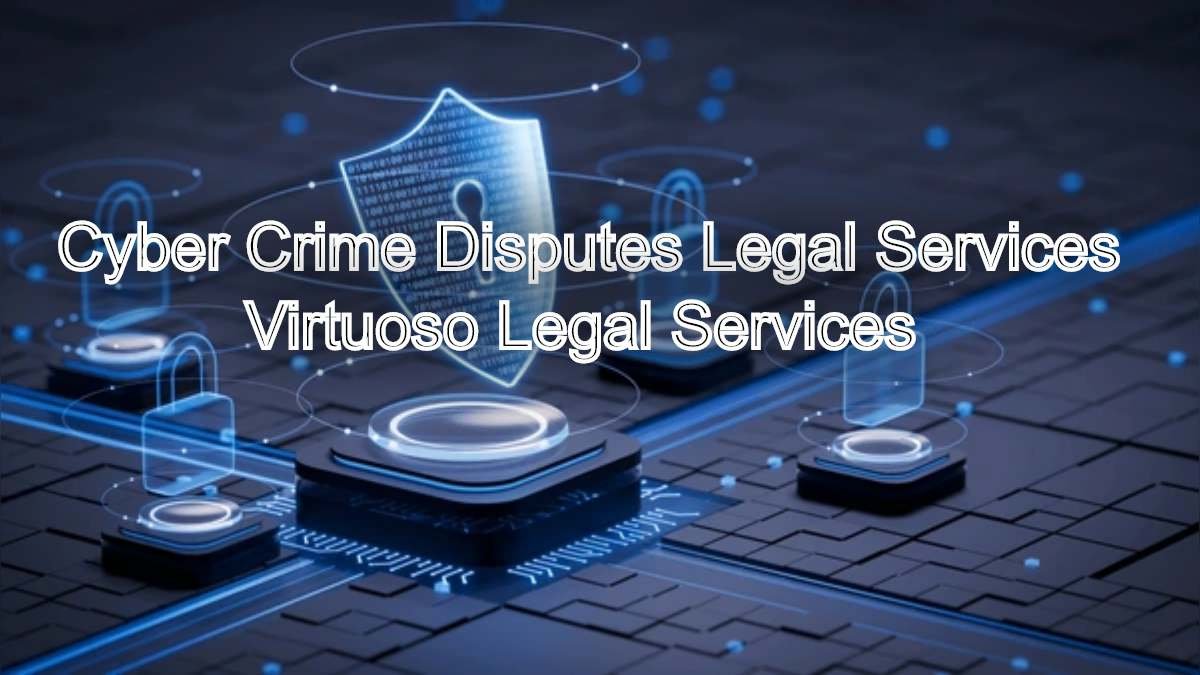Defending Digital Spaces: Cyber Crime Disputes Legal Services
Defending Digital Spaces: The digital world has become an integral part of our lives. We conduct business online, connect with friends, and manage personal finances through digital platforms. However, this increased reliance on technology also brings new vulnerabilities. Cybercrime, in its many forms, poses a significant threat to individuals and businesses alike. Therefore, understanding the nature of these threats and knowing how to respond legally is crucial. Virtuoso Legal Services offers expert legal solutions to navigate these complex digital disputes.
Defending Digital Spaces: Cyber Crime Disputes Legal Services: Virtuoso Legal Services
The Escalating Threat of Cybercrime
Cybercrime encompasses a wide range of illicit activities conducted using computers or the internet. For instance, this includes hacking, phishing, identity theft, online fraud, and cyberstalking. Moreover, ransomware attacks can paralyze businesses, while data breaches expose sensitive personal information. Consequently, the financial and reputational damage from such incidents can be devastating. Thus, the need for robust legal defense against these digital attacks has never been greater.
Furthermore, cybercriminals constantly evolve their tactics. They exploit new technologies and vulnerabilities. Therefore, staying ahead of these threats requires specialized knowledge and vigilance. A proactive legal strategy is essential for minimizing exposure and responding effectively when an incident occurs. Consequently, businesses and individuals must prioritize their digital security and legal preparedness.
Understanding Key Cybercrime Categories
To effectively defend digital spaces, it’s vital to recognize the different types of cybercrimes. Firstly, cyber fraud involves deceptive practices online to gain financial or personal information. This can include phishing scams, fraudulent online transactions, or bogus investment schemes. Secondly, data theft and breaches occur when unauthorized individuals access, copy, or transmit sensitive information. This often leads to identity theft or corporate espionage.
Furthermore, ransomware attacks involve malware that encrypts a victim’s files, demanding payment for their release. These attacks can cripple operations and result in significant financial losses. Additionally, cyberstalking and harassment involve using electronic communication to stalk or harass an individual, causing emotional distress or fear. Moreover, intellectual property infringement often happens online, with unauthorized use or distribution of copyrighted material, trademarks, or patented designs. Therefore, each category requires a tailored legal response.
The Indian Legal Framework Against Cybercrime
India has established a comprehensive legal framework to combat cybercrime. The primary legislation is the Information Technology Act, 2000 (IT Act), along with its subsequent amendments. This Act provides the legal basis for addressing various cyber offenses and digital evidence. For instance, it defines offenses like hacking, data theft, and publishing obscene information.
Furthermore, specific sections of the IT Act deal with penalties and adjudication. Sections 43 and 66, for example, address damage to computer systems and hacking. Section 67 pertains to publishing or transmitting obscene material in electronic form. Moreover, the Indian Penal Code (IPC) also has provisions that can be applied to cybercrimes, such as cheating (Section 420) or defamation (Section 499) when committed in the digital realm. Therefore, a successful legal defense often involves leveraging both the IT Act and relevant sections of the IPC. Consequently, understanding the interplay of these statutes is crucial for effective representation.
The Role of a Cyber Crime Disputes Lawyer
When you become a victim of cybercrime, engaging a specialized cyber crime disputes lawyer is paramount. They possess expertise in digital forensics, cyber laws, and evidence collection. For instance, they can advise on immediate steps to take to mitigate damage, such as preserving digital evidence and reporting the incident to relevant authorities. Consequently, their swift action can be critical in securing a favorable outcome.
Furthermore, a cyber lawyer helps in filing First Information Reports (FIRs) with law enforcement agencies, such as the Cyber Crime Cell. They ensure that the complaint is accurately documented and includes all necessary technical details. Moreover, they can represent you in civil or criminal proceedings, whether you are the victim seeking redress or an individual wrongly accused of a cybercrime. Therefore, their guidance is indispensable throughout the entire legal process.
Digital Evidence and Its Admissibility
In cybercrime disputes, digital evidence plays a central role. This includes data from computers, smartphones, servers, and cloud storage. However, collecting and preserving digital evidence requires specialized technical skills to ensure its integrity and admissibility in court. For instance, chain of custody protocols must be meticulously followed to prevent tampering.
Furthermore, the IT Act, particularly Section 65B, provides specific guidelines for the admissibility of electronic records as evidence. A cyber lawyer understands these technical and legal requirements. They work with forensic experts to gather, analyze, and present digital evidence effectively. Consequently, proving your case often hinges on the proper handling and presentation of electronic data. Thus, the expertise in digital forensics is as vital as legal knowledge.
Navigating Reporting and Investigation
Reporting a cybercrime is the first official step towards seeking justice. Victims typically report incidents to the Cyber Crime Cell or local police station. However, the initial report must be precise and technically accurate to facilitate an effective investigation. For instance, details like IP addresses, timestamps, screenshots, and transaction IDs are critical.
Furthermore, a cyber lawyer assists in the entire reporting and investigation process. They can liaison with law enforcement, ensuring that your case receives due attention and that the investigation progresses efficiently. Moreover, they can help in filing a cyber complaint through official government portals. Therefore, their involvement streamlines the reporting process and enhances the chances of successful prosecution or recovery. Consequently, proper reporting is the gateway to legal recourse.
Civil Remedies and Damages
Beyond criminal prosecution, victims of cybercrime can also seek civil remedies and damages. The IT Act allows for compensation to be paid to victims for various cyber offenses. For example, Section 43 provides for compensation for unauthorized access to computer systems, data theft, or causing damage to computers.
Furthermore, a cyber lawyer can help you assess the extent of your financial losses, including direct damages, reputational harm, and loss of business opportunities. They will then prepare and file a civil suit for compensation before the appropriate adjudicating officer or court. Consequently, pursuing civil remedies can help victims recover financially from the impact of cybercrime. Thus, legal recourse extends beyond just punishing offenders; it also focuses on victim recovery.
Defending Against False Accusations
Unfortunately, individuals can sometimes be falsely accused of cybercrimes. This can arise from misunderstandings, mistaken identity, or malicious intent from others. Facing such accusations can be incredibly distressing and damaging to one’s reputation and career. Therefore, immediate and expert legal defense is crucial.
Furthermore, a cyber crime disputes lawyer can build a strong defense strategy. They will investigate the allegations, analyze the digital evidence presented by the prosecution, and uncover any inconsistencies or errors. For instance, they can present evidence of alibis, demonstrate lack of intent, or challenge the authenticity of digital evidence. Thus, their role is to protect your rights and ensure a fair trial. Consequently, professional legal representation is indispensable when facing cybercrime allegations.
Proactive Legal Measures for Businesses
Businesses are particularly vulnerable to cybercrime due to their valuable data and reliance on digital infrastructure. Therefore, adopting proactive legal measures is as important as having reactive defense. For example, drafting robust cybersecurity policies, data privacy policies, and incident response plans are crucial.
Furthermore, a commercial transactions lawyer specializing in cyber law can help businesses conduct regular cybersecurity audits and ensure compliance with data protection regulations. They can also draft and review contracts with vendors and third-party service providers to ensure proper data security clauses are included. Consequently, investing in preventative legal measures can significantly reduce a business’s exposure to cyber risks and the need for dispute resolution. Thus, prevention is often better than cure in the digital realm.
Frequently Asked Questions
The primary legislation in India addressing cybercrime is the Information Technology Act, 2000 (IT Act), along with its subsequent amendments. This Act defines various cyber offenses, provides penalties, and outlines procedures for handling digital evidence.
A wide range of activities falls under cybercrime, including cyber fraud (like phishing or online scams), data theft and breaches, ransomware attacks, cyberstalking, harassment, and intellectual property infringement committed online. A lawyer can assist with legal recourse for victims of these varied offenses.
Digital evidence, such as data from computers or phones, is central to proving cybercrime cases. Its integrity and admissibility in court are vital. A cyber lawyer understands the specific requirements for collecting and preserving digital evidence (like Section 65B of the IT Act) and often collaborates with forensic experts to ensure it is handled correctly and presented effectively in court.
Yes, beyond criminal prosecution, victims of cybercrime can seek civil remedies and compensation. The IT Act, particularly Section 43, allows for damages to be paid for losses incurred due to unauthorized access, data theft, or other digital harms. A lawyer can help assess losses and file a civil suit for appropriate compensation.
Businesses can take proactive legal measures by developing robust cybersecurity and data privacy policies, and creating comprehensive incident response plans. A cyber lawyer can help draft these policies, conduct cybersecurity audits, and ensure vendor contracts include strong data security clauses, thereby significantly reducing cyber risks and potential disputes.
Conclusion
The pervasive nature of cybercrime necessitates a robust and informed legal response. From identity theft and online fraud to data breaches and ransomware attacks, the threats are constant and evolving. India’s legal framework, primarily the Information Technology Act, 2000, provides the statutory basis for addressing these digital offenses. Therefore, navigating this complex legal landscape requires specialized expertise.
Moreover, a dedicated cyber crime disputes lawyer from a firm like Virtuoso Legal Services – Expert Legal Solutions 24×7 offers invaluable assistance. They guide victims through reporting, evidence collection, and pursuing civil remedies. Simultaneously, they provide strong defense for those wrongly accused. Consequently, by combining legal acumen with an understanding of digital forensics, these legal experts play a critical role in defending digital spaces and ensuring justice in the cyber world. Therefore, proactive legal engagement is essential for safeguarding your digital assets and reputation in an increasingly interconnected world.
Read More
- Ensuring Customs Compliance: Customs Law Legal Opinions
- Fair Representation: Criminal Litigation Legal Experts
- Justice Prevails: Criminal Cases Legal Opinions
- Ensure Legal Compliance: Court Order Deed Services
- Celebrate Love Legally: Court Marriage Legal Opinion Services
- Indian Computer Emergency Response Team (CERT-In):
![Virtuoso Legal Services [Best Legal Opinion Services 24×7]](https://legalopinion.org.in/wp-content/uploads/2023/09/cropped-logo.png)






